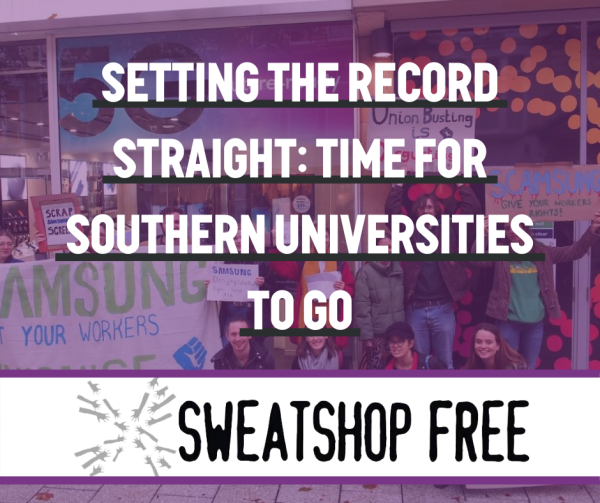Earlier this month the Southern Universities Purchasing Consortium (SUPC) co-signed an open letter with Electronics Watch (EW) clarifying the nature of SUPCS’ affiliation. Electronics Watch is a worker-driven monitoring organisation which audits supply chains within the global electronics industry, an industry which has been identified as high risk for modern slavery as well as a raft of other workers rights abuses. When a public institution (such as a university) affiliates to Electronics Watch, they are taking a clear stance that they will not tolerate human and workers rights abuses within their electronics supply chains.
This simple process is complicated by the use of purchasing consortia - where several universities come together to buy their electronics in bulk, so as to collectively bargain for a better deal on products. Purchasing consortia, like universities, are able to affiliate to Electronics Watch either in their own right (as an independent organisation) or on behalf of their members (i.e. all of the universities they purchase on behalf of). In 2017, SUPC affiliated to Electronics Watch in their own right, but not on behalf of their members.
The open letter therefore confirms what students have been asserting all along: That universities that are members of SUPC are not covered by the purchasing consortium's affiliation to Electronics Watch, and need to take action to ensure that their supply chains are sweatshop free.
Whilst this co-signed letter is an important step and welcomed by People & Planet as a recognition that Electronics Watch is a worthwhile and reputable monitoring organisation to affiliate too, this still left dozens of universities in Southern England without any guarantees that the electronics they were purchasing hadn’t been manufactured in a sweatshop. That is, unless the university was also an independent affiliate of Electronics Watch.
SUPCs affiliation also served to further muddy the waters as to who was, or wasn’t, having their supply chains monitored for unsafe working conditions. When approached by students about the issue of electronics supply chains, many southern universities, including Oxford Brookes, incorrectly claimed to be “covered” by Electronics Watch frameworks through their membership of SUPC, or otherwise imply that it was an issue for the purchasing consortium rather than the university itself. Two examples of the latter are the University of Surrey and the University of Plymouth. Thankfully, the open letter, published on May 11th, clearly asserts that members of SUPC which are not affiliated to Electronics Watch in their own right will not benefit from human rights due diligence requirements for suppliers and worker-driven monitoring, ensuring remediation of labour rights breaches. The letter can be read in full here.
People & Planet welcomes this crystal-clear clarification document from both SUPC and Electronics Watch, and hopes that universities in the south of England who are not yet affiliated to Electronics Watch will engage meaningfully with their students on the issue at hand: electronics being bought by UK universities are exposed to dangerous, unethical and illegal supply chains - it’s time to go #SweatshopFree and become full affiliates of Electronics Watch.
The fact remains that only three SUPC universities are affiliated to Electronics Watch, these being the Universities of Winchester, Sussex and Reading. The region’s universities are performing poorly when compared with Scotland and North West England, where purchasing consortiums have affiliated on behalf of every university and college. Email sweatshopfree@peopleandplanet.org to find out more or to launch a campaign at your university.
